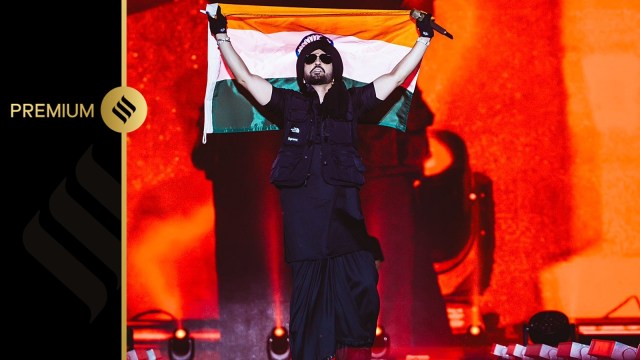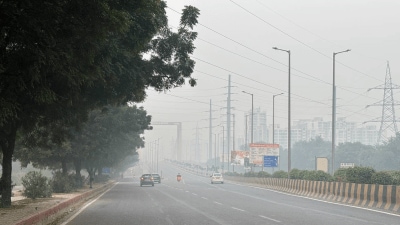Coldplay and Diljit Dosanjh concerts: Amid ticket scalping, challenges and the path forward in India
Ticket scalping in India has evolved over time, moving from black markets to online operations. Today, scalpers deploy bots and automation tools to snap up tickets in bulk, creating challenges for consumers and regulators alike.
 Diljit Dosanjh at the recently held concert in Delhi. (Photo: X/@diljitdosanjh)
Diljit Dosanjh at the recently held concert in Delhi. (Photo: X/@diljitdosanjh)Remember those classic Bollywood films from the 1980s and 90s, where a character whispers, “Das ka bees, das ka bees,” while flashing a pocketful of tickets? That playful portrayal of ticket scalping as a quick money-making scheme has become a familiar trope. But the reality of scalping today is far from charming — it’s a predatory practice that goes unnoticed unless someone falls prey to it.
What began as a survival instinct — hoarding — has evolved into a tool for profit. Now, instead of essentials, people hoard access. The frenzy is evident when tickets for events like Diljit Dosanjh’s or Coldplay’s concerts, sell out within minutes — only to reappear online at exorbitant prices.
From IPL matches to music festivals, online ticket scalping has become a widespread phenomenon. While ticketing platforms and limited regulations attempt to curb the practice, the absence of stringent government intervention has allowed it to flourish unchecked.
Scalping in India: From black markets to online platforms
Historically, ticket scalping in India was synonymous with black marketing. Outside cinema halls, vendors ran the “Dus-Ka-Bees” scheme, exploiting demand for blockbuster films. Over time, the practice has evolved into a more sophisticated operation, migrating online. Scalpers now use bots and automated tools to hoard tickets in bulk, leaving ordinary consumers struggling to secure access to popular events.
In some cases, event organisers themselves manipulate supply by withholding a portion of tickets from initial sales. Using bots and auto-refreshers, these tickets are quickly resold through secondary platforms at inflated prices, creating artificial scarcity.
A notable example is the case of Mandeep Singh v. State of Chandigarh (2015), where a seller was arrested for reselling World Cup match tickets on eBay and charged under Section 66A of the Information Technology Act and Section 420 of the Indian Penal Code (IPC) for fraud. The petitioner sought the quashing of the FIR, arguing that Section 66A had been struck down by the Supreme Court in Shreya Singhal v. Union of India (2015), and that no case under Section 420 was made out since there was no intent to cheat.
The Court acknowledged that Section 66A had indeed been struck down and noted that no offence under Section 420 IPC was established, as there was no inducement or deceit involved — the petitioner had openly disclosed the higher price of the tickets, and there was no legal prohibition against reselling them. The Court held that continuing the proceedings would amount to an abuse of the process of law and affirmed that, “In India, there is no legal restriction against reselling match tickets.”
Loopholes in regulation and consumer protection
Although Rule 4(11) of the Consumer Protection (E-Commerce) Rules, 2020, prohibits e-commerce platforms from manipulating prices to gain unreasonable profits, its enforcement remains weak.
In the case of Diljit Dosanjh’s Dil-Luminati Tour concert, a legal notice was filed alleging malpractice in the sale of tickets. It was claimed that the organisers opened ticket sales earlier than advertised, resulting in immediate sellouts. This sudden availability and ticket unavailability were interpreted as manipulative tactics to inflate demand and prices, potentially constituting an unfair trade practice under the Consumer Protection Act.
“Since tax liability can only be imposed on sellers, and most ticket-selling websites are not registered in India, they evade taxes. Events utilising government resources necessitate a legal framework to secure tax benefits and protect consumer rights,” says Ayush Kaushik, an Advocate at the Supreme Court of India.
In a complaint filed by lawyer Amit Vyas regarding ticketing practices for the upcoming Coldplay concert in Mumbai, it was alleged that BookMyShow engaged in unethical practices that obstructed genuine fans from purchasing tickets. The complaint accused the platform of allowing bots to purchase tickets, which then appeared on resale platforms at exorbitant prices, suggesting possible collusion between BookMyShow and third-party resellers.
The complaint cited several sections of the Bharatiya Nyaya Sanhita (BNS), 2023, that could be applicable to the alleged scalping activities. These include:
Section 111(2): Organised Crime – If scalping is organised to manipulate ticket prices, it could be viewed as an economic offence under organised crime, especially if coercion or fraud is involved.
Section 318(4): Cheating – If consumers are deceived into overpaying due to dishonest practices, this could be categorised as cheating.
Section 316(2): Criminal Breach of Trust – If a ticketing platform misuses tickets for resale at inflated prices, it could be seen as a breach of trust.
Section 61(2): Criminal Conspiracy – If multiple parties conspire to manipulate ticket availability through illegal means, this could be considered a criminal conspiracy.
 The crowd at Diljit Dosanjh’s concert in Delhi. (Photo: X/@diljitdosanjh)
The crowd at Diljit Dosanjh’s concert in Delhi. (Photo: X/@diljitdosanjh)
What are the legal implications of scalping in India?
India’s ticket scalping issue is addressed through laws like the Consumer Protection Act, Bhartiya Nyaya Sanhita, and state-specific legislation. For instance, Rajasthan Entertainments and Advertisements Act (1957) and Maharashtra Entertainments Duty Act (1923) prohibit ticket resale for profit and above face value, respectively.
Section 3 of the Competition Act, 2002, prohibits anti-competitive agreements and practices. While ticket scalping could theoretically involve collusive behaviour aimed at manipulating market supply and pricing, proving such informal arrangements is inherently difficult. Ticket scalping typically involves individual transactions that are not easily categorised as collusive behaviour, hindering effective legal action. Furthermore, the Act does not specifically target the issue of scalping, limiting its applicability in consumer protection contexts.
The Consumer Protection Act, 2019 includes provisions against unfair trade practices. According to Section 2(47) of the Act, an “unfair trade practice” refers to any method adopted to promote the sale, use, or supply of goods or services that involves deceitful, false, or misleading representations or actions. These practices can include: Misleading the public about the price of goods or services, implying they are sold at a regular rate when they are not. Hoarding or destruction of goods, or refusal to sell goods or provide services in a manner that raises the cost of goods or services (as outlined in Section 2(47)(v)).
In the context of ticket scalping, if a ticketing platform or organiser engages in hoarding by deliberately restricting the availability of tickets to create artificial scarcity, this could be classified as an unfair trade practice. For example, if a platform sells tickets but simultaneously uses bots to buy up a significant portion for resale at inflated prices, it could be seen as hoarding.
While the Consumer Protection Act provides some protections, its enforcement mechanisms are primarily designed for direct sales rather than the complexities of resale. Moreover, the absence of explicit anti-scalping provisions makes it challenging for consumers to seek redress.
“Consumer Protection Rules, 2020 require sellers to verify ticket authenticity. However, since tickets are sold through third-party websites, there’s no grievance redressal mechanism for buyers,” says Ayush Kaushik.
The BNS, the IT Act, the Consumer Protection Act, and the Competition Act, collectively illustrate the fragmented and ineffective approach to addressing ticket scalping. The lack of cohesive legislation creates significant gaps in consumer protection, allowing scalping to persist.
Scalping regulations in other countries
Internationally, countries combat ticket scalping through legislation. France prohibits resale above face value without organiser consent, while in the US, states like New York and California restrict resales to face value. The UK has amended its Consumer Act and Criminal Code to address the issue.
In Australia, Eventim UK Ltd v. Vivendi Universal SA case in 2009 reinforced contract enforcement against unauthorised resales. The Fair Trading Act in New South Wales limits resale prices to 10% above face value, while the Ticket Scalping Act 2018 penalises both usage.
The United Kingdom’s Consumer Rights Act 2015 mandates transparency in reselling, with the CMA successfully challenging Viagogo in Watson v. Viagogo. The Digital Economy Act 2017 enhances consumer protections, while R v. Andrew Lee and Peter Hunter resulted in scalper convictions under the Fraud Act 2006. In Canada, the Ontario Ticket Sales Act 2017 bans bots and caps resale prices at 50% above face value, reflecting a global trend towards stricter ticket scalping regulations.
Countries are leveraging technology to combat ticket scalping, adopting solutions such as blockchain technology for secure ticketing systems and AI-powered platforms to detect unusual sales patterns. However, modern technology complicates enforcement, enabling companies to exploit regulatory gaps and hinder local law enforcement.
Projects like Fanz and GUTS utilise blockchain for authenticity and trackability, enhancing security and transparency in ticketing systems. Advocate Mishi Choudhary, founder of SFLC.in, an advocacy platform that works for digital rights, however, says that blockchain can help with authenticity, not scalping. “For scalping, regulating prices is more effective.”
Proposed solutions
To combat ticket scalping effectively, there is a need for central legislation, considering international best practices and stakeholder impact, to ensure entertainment remains accessible to all.
“This is a matter which requires consideration at the Central level… someone in the Ministry of Finance and everyone should take a look,” says Vyas.
Proposed solutions include establishing specific anti-scalping legislation that clearly defines scalping practices and outlines penalties, alongside capping resale prices at a reasonable level, such as 10% above the original price, to deter scalping while allowing flexibility for genuine resellers.
Choudhary highlights the BOTS Act as a good example of legislation addressing automated ticket purchases leading to scalping. The Act requires disclosure requirements, monitoring, and reporting.
Encouraging primary ticketing platforms to create controlled secondary markets can enhance transparency while implementing stricter penalties for scalpers and buyers would emphasise the seriousness of this issue. Kaushik suggests compulsory ticket sales through Indian entities to combat black marketing and tax evasion, with criminal prosecution for violations.
Robust data privacy regulations should be introduced to protect consumer data and enhance the integrity of ticket sales. Additionally, Vyas suggests implementing Blockchain technology and forming a committee with a retired judge and cyber expert to provide guidelines to combat ticket scalping. Finally, it is crucial to address potential scalping practices by organisers themselves, who may manipulate ticket availability to drive up prices, potentially violating the Consumer Protection Act, 2019.
By drawing on global best practices and implementing effective technological solutions, India can create a fairer and more equitable ticketing environment that safeguards consumer interests while promoting a transparent and competitive market.
Naina Bhargava is a lawyer and the Founder and Editor at The Philosophy Project.







